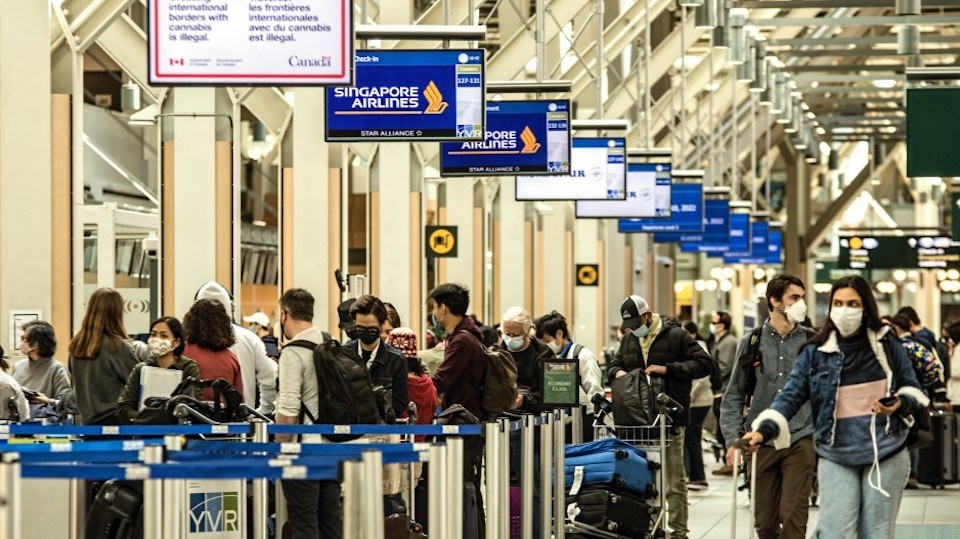Airlines, airport authorities and government agencies have scrambled all summer to find solutions to what has been the most disorganized and glitch-prone travel season in memory.
Strong demand stems from a perfect storm of COVID-19 travel restrictions easing around the world and the general public’s eagerness to travel after years of staying at home.
Pain points have popped up at each stage of the travel experience because there is too much demand and not enough labour supply at passport offices, airport screening lines, airlines and customs kiosks.
Tourism industry insiders and Conservative transport critic Melissa Lantsman have called for Canadian Transport Minister Omar Alghabra to end Canada’s requirement that travellers use the ArriveCan app because the mandate slows customs processing.
The harsh reality is that the likely solution to the congestion, line-ups and backlogs will be time.
July is peak season for travel into Canada via B.C. border crossings. The most recent year likely to resemble 2022 is 2019, and there were 949,540 overnight visitor entries in July of that year.
Overnight visitor entries then fell:
•2.8 per cent to 922,730 in August;
•another 32.4 per cent to 623,588 in September;
•another 44.9 per cent to 343,494 in October; and
•another 20.2 per cent to 273,999 in November.
B.C.-based travellers are caught up in that congestion because they book round-trip tickets that cause them to be mixed in with international visitors.
"I'd like to hope that we've seen the worst of it over the next month and once we get into September, [delays and line-ups] should start easing off as demand eases," said University of British Columbia Sauder School of Business adjunct professor John Korenic told BIV.
"November is the slowest month of the year."
Korenic, previously the Vancouver Airport Authority's (VAA) director of aviation marketing, said airlines often overbook flights to try to ensure flights are as filled as possible. The situation where airlines schedule entire flights that they do not have the personnel to fill, however, is an "anomaly," he said.
Air Canada (TSX:AC), for example, in late June announced plans to cancel about 15 per cent of its flights, or 154 one-way trips, in July and August.
Other airlines did similar things.
JetBlue Airways Corp. (Nasdaq:JBLU), which launched the only non-stop flights between New York City's John F. Kennedy International Airport and Vancouver International Airport (YVR) on June 9, had also planned to launch non-stop flights between Vancouver and Boston this summer.
It cancelled that route because the airline wanted to ensure it had sufficient staff for all routes so it would not need to delay flights, the airline's head of marketing and loyalty, Jayne O'Brien, told BIV. She estimated that JetBlue was cancelling about 10 per cent of its flights this summer because of staff shortages and the airline's desire to maintain customer satisfaction.
Airlines are hiring staff. Recent job postings for Air Canada flight attendants have pinned starting wages at $28.28 per hour.
Passport offices have been inundated with document applications, prompting Service Canada to take the controversial step of prioritizing people with imminent travel plans over those who have been waiting for weeks for new documents.
Recent job postings for passport-printing support staff list the starting salary as between $45,869 and $49,478.
The Canadian Air Transportation Security Authority (CATSA) subcontracts security screening at YVR to U.S.-based giant Allied Universal (AU), which is rapidly hiring new workers.
AU's vice-president of communications Sherita Coffelt told BIV that the company has about 1,000 workers at YVR, up from 800 a few months ago.
More recruits are in the pipeline, getting trained and awaiting government security clearances, she said.
The company offers bonuses to workers who successfully refer potential job applicants to AU, but it offers no signing bonuses.
AU workers have told BIV that working conditions are poor, with long stretches without breaks – all for a maximum of $22 per hour.
Many of those employees work many hours of overtime, at up to $33 per hour.
One of the Vancouver Airport Authority's (VAA) solutions to deal with increased passenger counts in April was to launch an 80-employee guest-experience team to work alongside green-coated volunteers.
This new blue-coated team of employees assists travellers where needed, and helps cut through communication barriers, given that they speak a combined 30 languages, VAA CEO Tamara Vrooman said.
Job postings for those workers did not list likely salaries.
Korenic said travellers who are flexible may want to wait for the fall not only because there will likely be shorter lines, but also new flight options.
Vancouver is set to get its first non-stop commercial flights to Bangkok starting December 1 (on Air Canada), and its first non-stop flights to Fiji starting November 25 (on Fiji Airways.)




